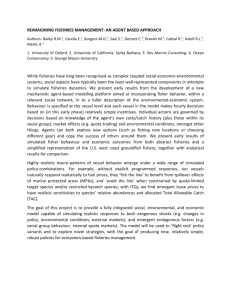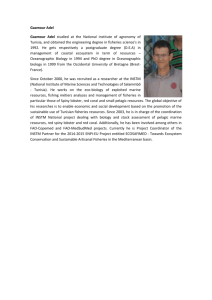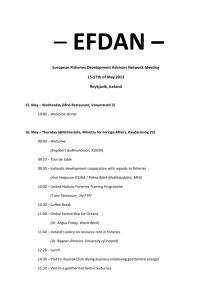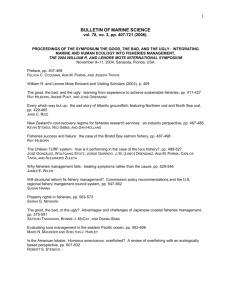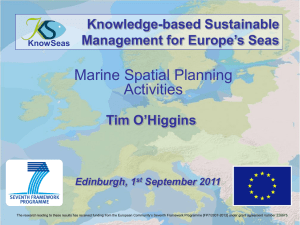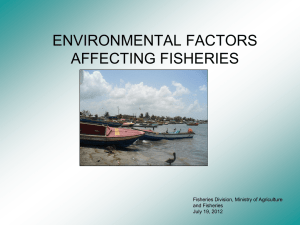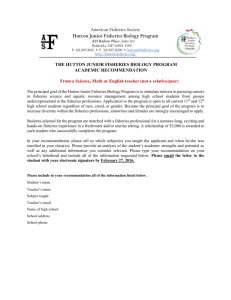`3-25-08 PPG SCS Fisheries Project final ver 25March08` in
advertisement
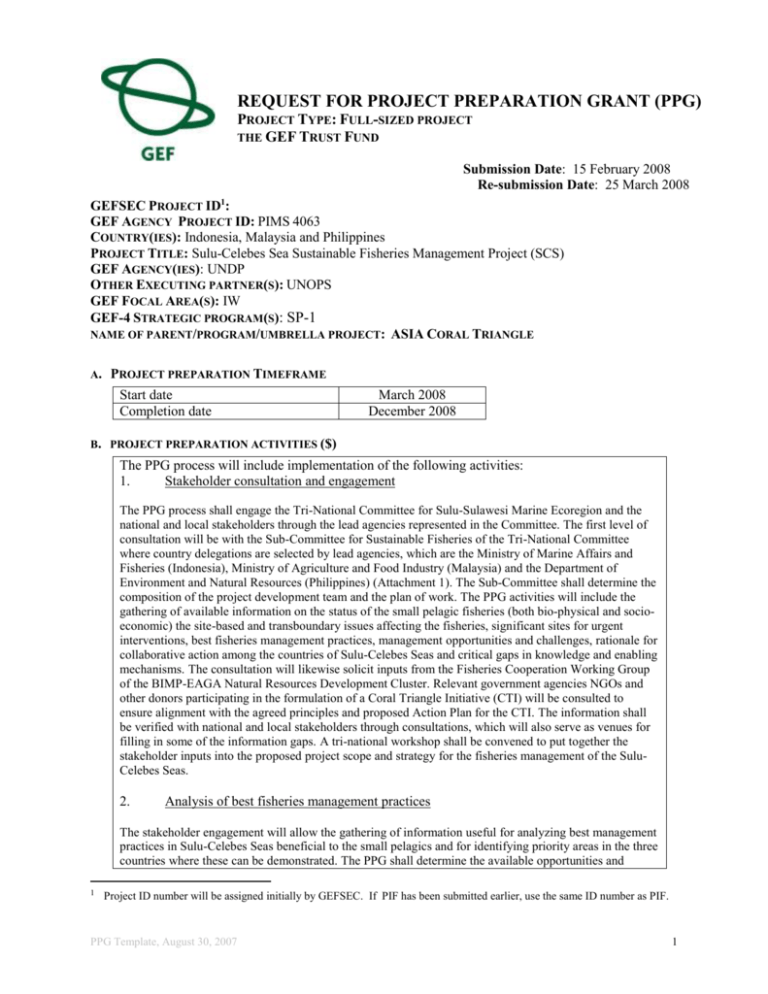
REQUEST FOR PROJECT PREPARATION GRANT (PPG) PROJECT TYPE: FULL-SIZED PROJECT THE GEF TRUST FUND Submission Date: 15 February 2008 Re-submission Date: 25 March 2008 GEFSEC PROJECT ID1: GEF AGENCY PROJECT ID: PIMS 4063 COUNTRY(IES): Indonesia, Malaysia and Philippines PROJECT TITLE: Sulu-Celebes Sea Sustainable Fisheries Management Project (SCS) GEF AGENCY(IES): UNDP OTHER EXECUTING PARTNER(S): UNOPS GEF FOCAL AREA(S): IW GEF-4 STRATEGIC PROGRAM(S): SP-1 NAME OF PARENT/PROGRAM/UMBRELLA PROJECT: ASIA CORAL TRIANGLE A. PROJECT PREPARATION TIMEFRAME Start date Completion date March 2008 December 2008 B. PROJECT PREPARATION ACTIVITIES ($) The PPG process will include implementation of the following activities: 1. Stakeholder consultation and engagement The PPG process shall engage the Tri-National Committee for Sulu-Sulawesi Marine Ecoregion and the national and local stakeholders through the lead agencies represented in the Committee. The first level of consultation will be with the Sub-Committee for Sustainable Fisheries of the Tri-National Committee where country delegations are selected by lead agencies, which are the Ministry of Marine Affairs and Fisheries (Indonesia), Ministry of Agriculture and Food Industry (Malaysia) and the Department of Environment and Natural Resources (Philippines) (Attachment 1). The Sub-Committee shall determine the composition of the project development team and the plan of work. The PPG activities will include the gathering of available information on the status of the small pelagic fisheries (both bio-physical and socioeconomic) the site-based and transboundary issues affecting the fisheries, significant sites for urgent interventions, best fisheries management practices, management opportunities and challenges, rationale for collaborative action among the countries of Sulu-Celebes Seas and critical gaps in knowledge and enabling mechanisms. The consultation will likewise solicit inputs from the Fisheries Cooperation Working Group of the BIMP-EAGA Natural Resources Development Cluster. Relevant government agencies NGOs and other donors participating in the formulation of a Coral Triangle Initiative (CTI) will be consulted to ensure alignment with the agreed principles and proposed Action Plan for the CTI. The information shall be verified with national and local stakeholders through consultations, which will also serve as venues for filling in some of the information gaps. A tri-national workshop shall be convened to put together the stakeholder inputs into the proposed project scope and strategy for the fisheries management of the SuluCelebes Seas. 2. Analysis of best fisheries management practices The stakeholder engagement will allow the gathering of information useful for analyzing best management practices in Sulu-Celebes Seas beneficial to the small pelagics and for identifying priority areas in the three countries where these can be demonstrated. The PPG shall determine the available opportunities and 1 Project ID number will be assigned initially by GEFSEC. If PIF has been submitted earlier, use the same ID number as PIF. PPG Template, August 30, 2007 1 mechanisms for promoting the integrated management approach of Growth-Control-Maintenance (GCM) in the proposed demonstration sites. 3. Appraisal of the fisheries, management systems, governance structures, and policies and gap analysis The stakeholder engagement will determine the data requirements, availability and sources of information and means to access the information to provide the basis for completing a thorough analysis of the status of small pelagic fisheries resources, management systems and governance structures. From the baseline data gathered, an analysis of the social and economic costs and benefits related to the sub-regional fisheries of the three countries will be assessed. The projected costs to the concerned economies given the present threats and interventions will be determined. Similarly, the socio-economic costs of the desired scenario of joint and collaborative actions of fisheries management by the three countries will be assessed. A comparative analysis will be made between the current and desired situations. The analysis shall also look at the policy, legal and institutional arrangements and agreements that support the integrated approach of Growth, Control and Maintenance in Sulu-Celebes Seas in line with the goal to regulate fishing pressure and reduce stress on the fish stocks. This will cover agreements and governance structures of the SSME at the tri-national level. Bi-lateral, national as well as local levels that are influenced by these larger agreements and structures will also be assessed. Other regional agreements and structures proposed to be included in the analysis are BIMP-EAGA, ASEAN, APEC, SDS-SEA Partnership and Coral Triangle Initiative. Relevant action plans, programs and projects under these agreements and governance regimes will be covered by this exercise. The analysis will examine the impacts of these existing agreements and governance strucutures on the status of existing fisheries resources/management, transboundary issues and priorities that will inform the design of the project. It will also seek to identify gaps in knowledge, sitebased interventions, policies and capacities for enforcement and management that must be addressed to deal with both site-based and transboundary issues, which impact the small pelagic resources. Key policy, legal and institutional gaps identified during the assessment process will be addressed by the SAP. 4. Institutional reforms to address capacity gaps/needs A review of institutional reforms needed to catalyze improved and coordinated fisheries management at the local, national and tri-national levels will be undertaken. The analysis will determine strategies for the effective implementation of both prevention and enforcement activities to reduce overfishing and improve management and may include: 1) capacity-building to improve law enforcement across the tri-national borders; 2) improvement of licensing and monitoring system of fishing boats to address the issue of dual registration; 3) approaches to fishing effort management such as fishing gear restrictions, size limits of fish catch, closed fishing seasons, and zoning of fishing areas; 4) policy development; 5) strengthening effective institutional mechanisms; 7) collaborataive scientific capacity to inform effective fisheries management; and 8) capacity for effective monitoring and evaluation. 5. Project Scoping and Definition Based on the consultations and analysis described above the PPG will finance the definition of the Project scope and strategy. This will include the identification, analysis and description of: - Background and context which will describe: o Geographic scope o Global significance o The PPG consultation process o Priority areas of concern (general priorities + demo sites) o An analysis of root causes (based on preliminary TDA results) o Legal, institutional, policy and socio-economic environment and gaps analysis (based on the preliminary TDA) - Rationale and objectives which will include: o Rational for a GEF intervention (Justification of added value of GEF) PPG Template, August 30, 2007 2 o o o o o o o o o o Local, national and global environmental benefits sought Project goals, objectives, outcomes, outputs and activities constituting the most effective response to the agreed fisheries issues to be addressed Targeted beneficiaries Stakeholder participation and partnerships Risks and assumptions Incremental costs and financing Cost effectiveness analysis Implementation and execution arrangements Monitoring and evaluation (including a logical framework that identifies a suite of IW indicators (process, stress reduction and environmental status) to track the project’s progress) Sustainability and replicability. List project preparation activities Stakeholder consultation and engagement Analysis of best fisheries management practices Analysis of existing regional agreements and governance structures Institutional reforms to address capacity gaps/needs Project Scoping and Definition GEF Grant 40,000 15,000 10,000 Co-financing 40,000 10,000 10,000 Total 80,000 25,000 20,000 20,000 0 85,000 10,000 30,000 100,000 30,000 30,000 185,000 Total project preparation financing * No PPG management costs will be covered by GEF financing. C. PPG BUDGET REQUESTING FINANCE BY GEF Cost Items Local consultants * International consultants* Miscellaneous Travel Total PPG Budget Total Estimated Person Weeks (PW) 18 (GEF) 17 (GEF) GEF ($) 24,750 38,250 0 22,000 85,000 Co-financing ($) 30,000 20,000 10,000 40,000 100,000 Total ($) 54,750 58,250 10,000 62,000 185,000 National Consultant = 275/day x 5 = 1,375 per week x 18 =24, 750 International Consultant = 450/day x 5 = 2,250 per week x 17 = 38,250 *Split between local and international consultants might be indicative and subject to the procurement guidelines of the Agencies. Additional information regarding consultants should be provided in Annex A. CO-FINANCING SOURCES: UNDP: $20,000 (MFF) Philippines: $20,000 Indonesia: $20,000 Malaysia: $20,000 NGOs (e.g. CI): $20,000 PPG Template, August 30, 2007 3 D. GEF AGENCY(IES) CERTIFICATION This request has been prepared in accordance with GEF policies and procedures and meets the GEF criteria for project identification and preparation. Anna Tengberg UNDP/GEF Regional Technical Advisor John Hough UNDP/GEF Deputy Executive Coordinator, a.i. Date: 25 March 2008 PPG Template, August 30, 2007 Tel. and Email: Anna.Tengberg@undp.org 4 Annex A Consultants Financed by the Project Preparation Grant (PPG) Position Titles Local National Specialist [Marine fisheries expert, with policy and socio-economic background] – Indonesia National Specialist [Marine fisheries expert, with policy and socio-economic background] – Malaysia National Specialist [Marine fisheries expert, with policy and socio-economic background] – Philippines PPG Template, August 30, 2007 $/ Person Week Estimated PWs 1,375 18 Tasks to be performed Identify national stakeholders (Government, non-government organizations, fisheries experts) to be engaged in PPG activities; Facilitate stakeholder consultation and information dissemination; Develop a stakeholder participatory matrix on best fisheries management practices in Indonesia; Complete a description of existing data holding for small pelagic fisheries; Draft a profile of small pelagic fisheries in Indonesia that describes the baseline situation in early 2008, status and trends; Complete an analysis of existing policy, legal and institutional arrangements for conservation and management of small pelagic fisheries in Indonesia; Describe regional consultative arrangements, responsibilities, relationships for small pelagic fisheries and relevance in respect of Indonesia’s engagement; Describe international responsibilities and level of Indonesia’s engagement; Undertake an analysis of social and economic costs and benefits associated with the national fisheries; Collect and summarize information required to identify and prioritize transboundary fisheries management concerns that need prompt tri-national action by IMP; Provide periodic project status briefings to key stakeholders especially government representatives. Identify national stakeholders (Government, non-government organizations, fisheries experts) to be engaged in PPG activities; Facilitate stakeholder consultation and information dissemination; Develop a stakeholder participatory matrix on best fisheries management practices in Malaysia; Complete a description of existing data holding for fisheries for small pelagic fisheries; Draft a profile of small pelagic fisheries in Malaysia that describes the baseline situation in early 2008, status and trends; Complete an analysis of existing policy, legal and institutional arrangements for conservation and management of shared oceanic fish stocks in Malaysia; Describe regional consultative arrangements, responsibilities, relationships for small pelagic fisheries and relevance in respect of Malaysia’s engagement; Describe international responsibilities and level of Malaysia’s engagement; Undertake an analysis of social and economic costs and benefits associated with the national fisheries; Collect and summarize information required to identify and prioritize transboundary fisheries management concerns that need prompt tri-national action by IMP; Provide periodic project status briefings to key stakeholders especially government representatives. Identify national stakeholders (Government, non-government organizations, fisheries experts) to be engaged in PPG activities; Facilitate stakeholder consultation and information dissemination; Develop a stakeholder participatory matrix on best fisheries management practices in the Philippines; Complete a description of existing data holding for fisheries for small pelagic fisheries; 5 Draft a profile of small pelagic fisheries in the Philippines that describes the baseline situation in early 2008, status and trends; Complete an analysis of existing policy, legal and institutional arrangements for conservation and management of shared oceanic fish stocks in the Philippines; Describe regional consultative arrangements, responsibilities, relationships for small pelagic fisheries and relevance in respect of the Philippine’s engagement; Describe international responsibilities and level of the Philippine’s engagement; Undertake an analysis of social and economic costs and benefits associated with the national fisheries; Collect and summarize information required to identify and prioritize transboundary fisheries management concerns that need prompt tri-national action by IMP; Provide periodic project status briefings to key stakeholders especially government representatives. International Fisheries Socio-economic analysis adviser 2,250 17 Consolidate data and information generated at the national level; Specifically, this includes: Best fisheries management practices in the three countries; Existing data holding for fisheries for small pelagic fisheries at the tri-national level; Profile of small pelagic fisheries in the region that describes the baseline situation in early 2008, status and trends; Analysis of social and economic costs and benefits associated with the fisheries in the region Identify regional stakeholders (Government, non-government organizations, fisheries experts) to be engaged in PPG activities based on recommendations by the national consultants; Facilitate stakeholder consultation and information dissemination at the regional level; Collect and summarize information required to identify and prioritize transboundary fisheries management concerns that need prompt tri-national action by IMP, based on national and tri-national consultations; Provide periodic project status briefings to key stakeholders especially government representatives. Policy and Institutional Specialist PPG Template, August 30, 2007 Conduct a comprehensive analysis of existing policy, legal and institutional arrangements for conservation and management of shared oceanic fish stocks at the tri-national level; Describe regional consultative arrangements, responsibilities, relationships for small pelagic fisheries and relevance in respect of the engagement of the three countries; Describe international responsibilities and level of engagement of the three countries on fisheries management; 6 Attachment 1: Composition of country delegation to the First Meeting of the Sub-Committee for Sustainable Fisheries, Tri-National Committee for Sulu-Sulawesi Marine Ecoregion, Kota Kinabalu, Sabah, Malaysia, 2021 March 2007 CHAIR: Department of Fisheries Sabah (Malaysia) DELEGATION OF INDONESIA: Research Center for Aquaculture Fisheries, Ministry of Marine Affairs and Fisheries Research Center for Capture Fisheries, MMAF Conservation and Marine National Parks, MMAF WWF-Indonesia DELEGATION OF MALAYSIA: Ministry of Agriculture and Food Industry Department of Fisheries Sabah Department of Fisheries Malaysia Environmental Protection Department WWF-Malaysia DELEGATION OF PHILIPPINES Bureau of Fisheries and Aquatic Resources, Department of Agriculture Conservation International-Philippines PPG Template, August 30, 2007 7


